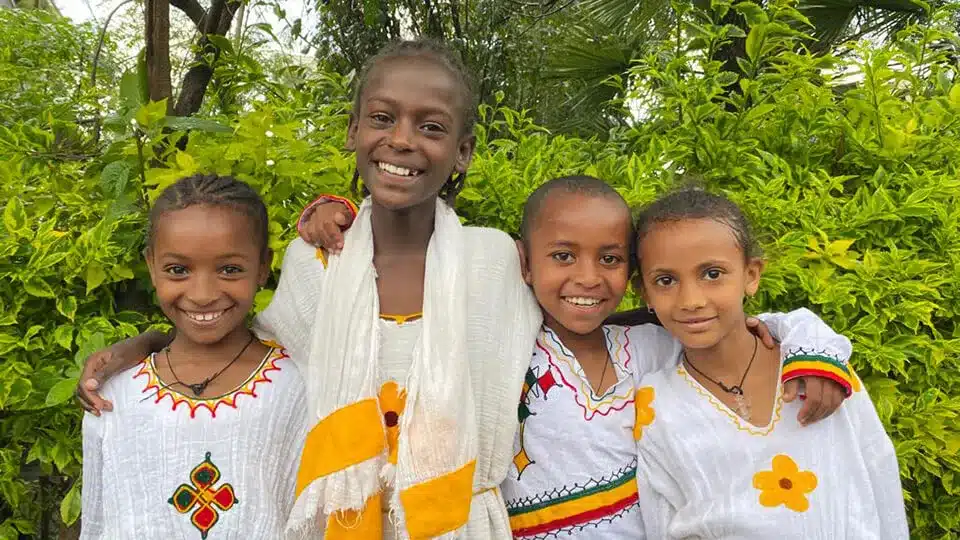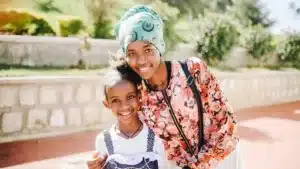
Happy New Year from AGCI! We pray the year ahead is one of joy, peace, and blessings for your family.
Around the world, people are ringing in and setting intentions for 2024. Below, we share how our friends in the countries AGCI serves in celebrate the New Year. Whether you are an adoptive parent or are interested in other cultures, you can learn more about how others around the world rang in the New Year!
BULGARIA
Like many ringing in the New Year, Bulgarians celebrate on New Year’s Eve eating plenty of tasty food. From roast turkey to pork chops or the traditional “Banitsa,” a baked mixture of eggs and cheese layered within a pastry and containing a New Year fortune, the Bulgarian dinner table on December 31 is full with delicious treats. Another fun Bulgarian tradition is “survakane,” a ritual practiced by children the morning of January 1. In Survakane, children gather in the early morning and travel house to house, lightly tapping friends and family members on the back with a decorated wooden stick while singing a song for good luck and health. In response to their visit, the children’s hosts give them sweets, walnuts, or even money to show their gratitude.
BURUNDI
In Burundi, people ring in the New Year with dancing, eating, and drinking. Music is an important part of the holiday, with traditional drumming and dancing. Burundians also enjoy the first of the year by watching soccer and playing the African board game Mancala. Celebrated throughout the country, the New Year is a time of feasting and laughter, where you may be wished “Umwaka Mwiza,” or “beautiful year” in the Burundian language of Kirundi.
CHINA
Celebrated between January 21 and February 20
Following the lunisolar Chinese calendar, the Chinese New Year is one of the country’s largest holidays, celebrated just a few short weeks after much of the world rings in the New Year January 1. Also called the Spring Festival, the holiday is marked by the color red, which symbolizes prosperity. In 2024, the holiday, commemorating the year of the dragon, will be celebrated on February 10.
The Chinese New Year dates back to the Shang Dynasty of the 14th century B.C. Today, the holiday is marked by time with family, a New Year’s Eve meal typically including fish for good luck, and, finally, a Lantern Festival of dances, fireworks, parades, and games.
COLOMBIA
Similar to the United States, New Year’s celebrations in the country of Colombia feature delicious food on New Year’s Eve and a champagne toast at midnight. Colombian tradition ties the New Year with luck for the year ahead. On New Year’s Eve, Colombians eat one grape every time the clock chimes, believing that if you eat 12 grapes (representing the 12 months of the year) as the clock strikes midnight, you will have good luck for the year.
Other traditions include filling your pockets with lentils on New Year’s Eve to signify a bountiful year, taking your suitcase on a walk around the block to ring in a year full of travel, and cleaning your home to ensure bad memories from the previous year are cleared, and new memories can be made.
COSTA RICA
New Year’s in Costa Rica is spent with family and friends, enjoying a large meal together. On the menu are food like pork roast or barbecued meats. Many Colombian traditions, like walking a suitcase around the block or eating 12 grapes at midnight, are also celebrated by Costa Ricans. At midnight fireworks light up the sky, and Costa Ricans wish each other a “Feliz año nuevo!”
ECUADOR
Ecuador’s main New Year tradition is “los año viejos,” large scarecrow-like dummies stuffed with paper, cardboard, or sawdust and dressed in old clothes. Ecuadorians gather together with friends and family on New Year’s Eve to burn these dolls in a fire, saying goodbye to the bad things–sadness, prejudices, problems–from the past year. Ecuador also shares the tradition of taking luggage around the block, and, like much of the world, there is a champagne toast at midnight, and couples ring in the New Year with a kiss.
ETHIOPIA
Celebrated in September
The country of Ethiopia follows the 13-month Julian calendar, meaning it’s technically only 2016 in Ethiopia! The Ethiopian New Year, celebrated on September 11 in regular years or September 12 in leap years, has a rich cultural history. The official celebration is referred to as “Enkutatash,” meaning “Gift of Jewels.”
The Ethiopian New Year is a time to reflect on the past and look forward to what’s next. It is a celebration of renewal and hope. The day commences with church services and traditional songs, a time of gathering and sharing in “Doro Wot,” a meal of spices chicken stew with injera, traditional honey wine, and fresh Ethiopian coffee. Children play a special role in the holiday, going door to door and offering songs and paintings in exchange for small gifts.
GHANA
Ghana’s New Year celebrations include street celebrations, beach trips, and live music. The celebrations begin with a masquerade festival, with a Mardi Gras energy. Most celebrations are done outside and include meals and gifts. Others celebrate the holiday in churches with prayers, singing, and drumming, committing the New Year to God. At midnight, Ghanaians will wish an “Afehyia pa” or “Efe na wo”, or “lame se,” which means “Happy New Year and good health” in Ghana’s Twi and Ewe languages.
HAITI
In Haiti, New Year’s Day is also Haitian Independence Day. A squash-based soup, “soup joumou,” is sure to be on the menu for January 1. The soup, made with pasta, meat, potatoes, and veggies, is a symbol of country pride and heritage. The holiday features a heightened sense of freedom and independence as Haitians wish each other a “Bòn Ane,” or “Happy New Year.”
PHILIPPINES
Like China, some of our friends in the Philippines celebrate the Lunar New Year; however, most of the country rings in the New Year on January 1. In the Philippines, there’s a midnight feast of foods, like twelve fruits (representing twelve months in a year) and rice cakes. Filipinos wear polka dots, which is said to bring good fortune. Another fun tradition in the Philippines occurs when the clock strikes midnight, and children jump–it’s said jumping will make the children grow taller.
SOUTH AFRICA
South African traditions also represent leaving bad things in the past, like throwing old furniture and appliances out of their windows. The New Year is marked by celebrations and fireworks, and even a parade or two. Like those in the U.S., South Africans also dedicate time in the New Year to reflecting on the prior year and making New Year resolutions.
We wish a very happy New Year to you and yours! May God bless your year ahead. “Therefore, if anyone is in Christ, the new creation has come: The old has gone, the new is here!” 2 Corinthians 5:17













